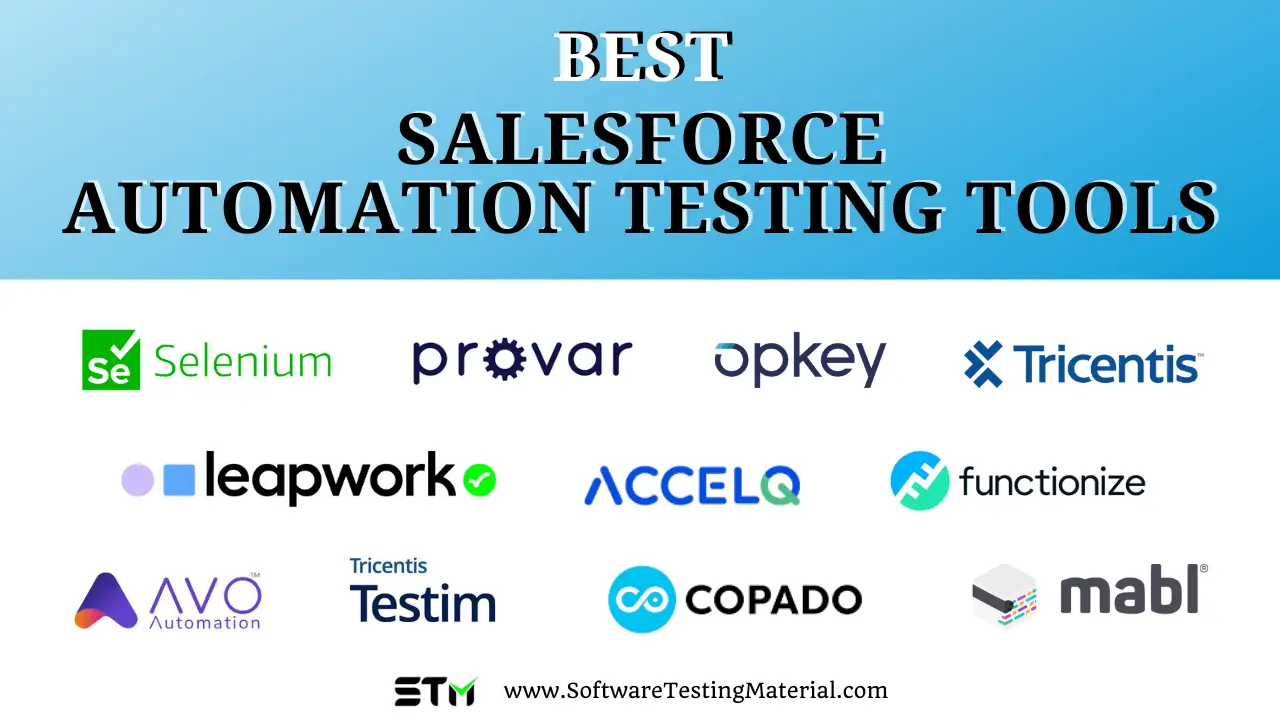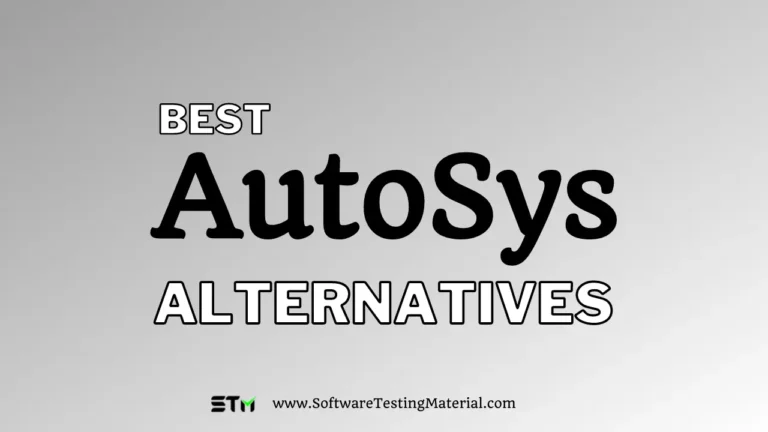11 Best Salesforce Automation Testing Tools in 2025 (Free & Paid)
In the fast-changing field of Salesforce development, Salesforce automation testing tools stand at the forefront. They play a key role in checking that everything in Salesforce runs smoothly and without errors, which can save a lot of time and headaches.
We’ve found the best Salesforce Testing tools that are user-friendly and really get the job done well.
So, if you’re looking for the best AI-powered Salesforce Test Automation Tools to help you test more effectively, you’re in the right place.

Challenges with Salesforce Manual Testing
Testing Salesforce manually comes with its own set of challenges. Here are some common issues you might encounter when doing manual testing in Salesforce.
#1. Time-Consuming Execution: Manual testing of Salesforce applications can be incredibly time-intensive. Testers must execute repetitive test cases with each release or after any significant change, consuming valuable time that could be used for more critical tasks.
#2. Human Error Factors: The risk of human error is significantly increased with manual testing. Omissions and mistakes during test case execution can lead to inaccurate test results, potentially allowing defects to go unnoticed until they impact end users.
#3. Inadequate Test Coverage: Achieving full test coverage manually is a daunting task. Given the complexity of Salesforce, especially with custom implementations, it’s easy to miss out on certain scenarios or workflows, leading to gaps in the testing process.
#4. Scaling Challenges: As the Salesforce instance grows with more customizations and integrations, the manual test suite becomes harder to maintain and scale, potentially leading to a backlog of untested changes.
#5. Difficulty in Testing Dynamic Content: Salesforce often employs dynamic content and real-time data updates, which can be challenging to validate manually as it requires constant attention and immediate testing to ensure accuracy.
#6. Lack of Consistency and Standardization: Manual testing relies heavily on the tester’s expertise and experience, which can create inconsistencies in how different testers perform and report on tests, impacting the reliability of the results.
#7. Complex Customization: Salesforce provides plenty of options for customization, whether it’s through declarative tools or code (Apex). However, all this complexity can make it tough to comprehend and test custom workflows, validation rules, triggers, and intricate business logic.
#8. Test Data Management: Testing Salesforce involves handling test data with care. It can be pretty tedious and time-consuming to create, maintain, and update test data for different scenarios.
Why Should You Opt for AI-powered Test Automation in Salesforce?
- Faster Results: AI can test things quickly, so you find out faster if there’s a problem.
- Smarter Testing: It learns from past tests, so it gets better at finding bugs.
- Less Repetitive Work: It can do boring test jobs by itself, so people can do more interesting work.
- Always Ready: AI testing can run any time, so it keeps working even when people are off.
- Self-healing: These tools utilize AI/ML-powered core and Natural Language Processing capabilities to automatically update and adjust tests, ensuring reliable test executions and minimizing failures.
- End-to-End Validation: AI-powered test automation tools seamlessly integrate with UI and functional testing tools, allowing end-to-end validation of complex Salesforce apps across Classic and Lightning instances and their components.
- Saves Money: By working fast and reducing mistakes, it can save companies money in the long run.
Best AI-Powered Tools for Salesforce Automation Testing
#1. Selenium

Selenium is a powerful suite of tools that can automate web browsers. It’s like a remote control for browsers, allowing developers to write code that makes the browser perform actions just like a human would.
This is especially handy for testing web applications to make sure they work as expected. Selenium can mimic clicks, typing, and other user actions to test the functionality of web applications thoroughly.
Selenium can be used in Salesforce testing. Since Salesforce applications are web-based, Selenium can interact with them just like any other web application, automating tests for various Salesforce functionalities.
Features of Selenium:
- Cross-Browser Compatibility: It allows tests to be run on different browsers like Chrome, Firefox, and Internet Explorer.
- Language Support: It supports many programming languages including Java, C#, Python, and Ruby, giving a wide choice to write tests.
- Flexibility: Selenium’s variety of tools and libraries provide a lot of flexibility in how to write tests.
- Integration: It can be integrated with other tools for continuous integration (such as Jenkins) and test management tools.
- Community Support: It has a strong community that contributes to its development and provides ample support.
#2. Provar

Provar is a Salesforce test automation tool designed specifically for Salesforce, aiming to simplify the complexities of testing Salesforce applications. Unlike other general-purpose tools, Provar is built to work seamlessly with Salesforce’s unique architecture, which means it can handle the customizations and configurations unique to Salesforce.
This compatibility ensures that businesses can test their Salesforce implementations effectively and with ease.
Provar is tailored to recognize Salesforce-specific elements, making it an excellent choice for organizations that rely heavily on Salesforce for their operations.
Features of Provar:
- Salesforce-Specific Functionality: Custom-built to test Salesforce applications including standard and custom objects, visualforce pages, and more.
- No-Code Testing: Allows for point-and-click test case generation, which means even those without coding knowledge can create tests.
- Callable tests: Provar Automation’s callable test cases create reusable test cases, increasing efficiency and reducing errors and maintenance. It helps teams organize, manage, automate, and scale their Salesforce workflow and beyond.
- Resilent Tests: Tests built-in Provar Automation are resilient in their reusable, standing up to being used in various contexts across different orgs, languages, and user profiles. This enhances testing efficiency and scalability, enabling organizations to streamline efforts and achieve faster time-to-market.
- Data-Driven Testing: Facilitates testing with multiple data sets to ensure comprehensive coverage.
- Reporting: Offers detailed test reports and dashboards to monitor the testing process’s effectiveness.
- Continuous Integration: Integrates well with CI/CD pipelines, making it a robust solution for Agile and DevOps teams.
- Metadata Integration: It uses Salesforce metadata to keep tests up to date, reducing maintenance effort.
#3. Opkey

OpKey is a no-code salesforce test automation tool that revolutionizes the way Salesforce testing is done.
This platform is built to be user-friendly and accessible for both technical and non-technical users, empowering teams to create, execute, and manage automated tests on Salesforce without writing any code.
Along with Salesforce testing it also supports automating Oracle Cloud testing, Oracle EBS testing, Workday testing, Coupa testing, SAP testing, Microsoft Dynamics testing, Veeva testing, TrackWise testing, and UKG (Kronos) testing.
Features of Opkey:
- No-Code Interface: Empowers users to automate tests quickly using a drag-and-drop interface.
- Cross-Browser and Cross-Device Testing: Offers the flexibility to test across multiple browsers and devices to ensure comprehensive coverage.
- AI-Powered Impact Analysis: Uses artificial intelligence to predict the impact of changes made within Salesforce, thereby minimizing risks.
- Self-Healing Scripts: Its smart tests adapt to changes in the Salesforce environment, reducing the maintenance required for test scripts.
- Intuitive Dashboards: Provides insightful dashboards that give real-time visibility into the status of testing activities and outcomes.
- Impact analysis: You’ll get proactive alerts about which tests will be affected before you push any changes to production.
- Integration: It seamlessly integrates with test management tools like ALM, Jira, Azure DevOps, qTest , Bitbucket, MS Azure Pipeline, Octane, CI/CD tools like Jenkins, and Bamboo, and Device Farms like pCloudy, and Sauce Labs
- Collaborate & report: You can communicate with colleagues about broken tests directly on Opkey’s platform. It automatically generates reports and saves you major time.
#4. Tricentis Test Automation for Salesforce

Tricentis Test Automation for Salesforce simplifies the complexities of software testing and automates your Salesforce environment through customized pre-built steps, to make test case creation easy for developers, admins, and business testers.
It ensures Salesforce applications work flawlessly. It’s specifically designed for use in Salesforce Testing, making that often-tedious process so much smoother and smarter.
Features of Tricentis Test Automation for Salesforce:
- Compatibility & Coverage: It is compatible with all versions of Salesforce, including all apps, allowing for seamless scaling of testing, automated testing orchestration, and accelerated development and release compared to other general testing solutions.
- Pre-built steps and recorder: You can easily create test cases using pre-built actions tailored to your Salesforce environment.
- End-to-end Testing: Not limited to just Salesforce – Tricentis offers the ability to conduct end-to-end testing across multiple platforms and systems that interact with Salesforce.
- Maintenance: AI-powered locators adapt and auto-improve to maintain stable tests and minimize updates.
- Intuitive reporting: You can easily check out test results and find issues with its user-friendly dashboards.
- Scale efficiently with TestOps: Organize and manage your tests and team efficiently, track test changes accurately, and extract valuable insights from your testing efforts to drive continuous improvement.
#5. Leapwork

Leapwork is an AI-powered visual test automation platform that lets you build, maintain, and scale automation faster. Leapwork is a tool designed to make the process of testing software simpler and more accessible by eliminating the need to write code.
With its codeless approach, testers can create automated workflows using visual blocks that represent different functions and commands. This empowers individuals, regardless of their technical background, to contribute to the quality assurance of applications.
With Leapwork, you can automate across all applications and technologies such as Microsoft Dynamics 365, Salesforce, SAP, and IBM Mainframe.
Features of Leapwork:
- Visual Workflow Designer: A drag-and-drop interface to create test automation flows.
- Cross-Platform Support: Able to automate tests across web applications, desktop applications, and even virtual environments.
- Run tests in parallel: You can run your test scripts in parallel using Selenium Grid, and you can also use cloud providers like BrowserStack and Sauce Labs for that.
- Reusable Components: Test cases or parts of cases can be saved and reused across different tests to increase efficiency.
- Smart Recordings: Automatically generates test steps by recording user interactions with applications.
- Scheduled Runs: Tests can be scheduled to run at specific times, unattended.
- Integrations: Seamlessly connects with popular CI/CD tools, bug tracking systems, and version control systems.
- Real-Time Results: Provides instant feedback through dashboards, making it easier to identify and resolve issues.
- Reporting tools: Leapwork provides various reporting and monitoring tools, including visual dashboards and structured reports. With Leapwork, you can create multiple reports as needed, such as per product being tested, per user, per day, or any combination. Reports can be exported as PDF, HTML, or Excel files for easy sharing and further data processing.
#6. AccelQ

AccelQ is an AI-Powered Codeless Test Automation on the Cloud that help teams test their applications without writing a single line of code. This means even those without extensive programming knowledge can efficiently create and run tests, making the whole process quicker and less prone to errors. AccelQ is also incredibly useful for Salesforce testing, because it offers seamless integration, allowing testers to ensure that Salesforce applications work flawlessly.
AccelQ is a leading Continuous Testing & Automation platform on Salesforce Appexchange, ensuring smooth Salesforce upgrades with robust Automation testing.
Features of AccelQ:
- Codeless Test Automation: Create automated test cases with an intuitive user interface.
- Continuous Integration and Delivery: Easily integrates with CI/CD pipelines, promoting agile development.
- Intelligent Test Management: Prioritize and manage test cases efficiently, improving test cycles.
- Cloud-Based Platform: Access the tool from anywhere, facilitating remote collaboration among teams.
- ERP Platforms: It supports Salesforce, Pega, SAP, ServiceNow & Workday
- Cross-Browser and Multi-Platform Support: Test applications across various browsers and devices.
#7. Functionize

Functionize is an AI-powered no-code automation tool designed to make testing easier for everyone, even those with no experience in coding. Essentially, it allows users to automate the testing process of their web applications and Salesforce platforms without the need to write complex code. This makes it highly accessible for teams that want to ensure their software is working smoothly but may not have coding expertise.
The beauty of Functionize is that it can be used effectively for Salesforce testing, ensuring that all functions within Salesforce are running correctly. Not only does it simplify the testing process, but it also comes loaded with features such as artificial intelligence that can predict and solve potential problems, cloud-based testing that can be scaled easily, and analytics that give insights into the testing process.
Features of Functionize AI-Powered No-Code Automation Tool:
- Smart Test Creation: Utilizes machine learning to convert plain English into automated tests, removing the barrier of test scripting.
- Adaptive Event Analysis: Functionize’s AI recognizes and adapts to changes in the web application, mitigating the need to constantly update tests.
- No Coding Required: Tests can be created using plain English via NLP, or using Functionize Architect (smart recorder)
- Test Cloud: The Functionize Test Cloud has data centers all over the world, allowing you to rerun your tests in different locations to replicate your Salesforce users’ experience.
- Self-healing Tests: Salesforce’s dynamic objects and iframes usually mess up the usual scripted tests. But with Functionize, the tests use machine learning to fix themselves, cutting test maintenance time by 85%.
- Integrate with CI/CD: Get your testing suite in sync by running tests alongside your current CI/CD pipeline. Take advantage of built-in integrations to send test failures to Slack, Jira, or PagerDuty.
- Visual Testing Capabilities: Ensures the user interface looks and functions as intended by comparing screenshots over time.
- Cloud Execution and Scalability: Offers a robust cloud infrastructure that supports parallel test execution, enabling scalability and speed.
- Analytics and Insightful Reporting: Provides detailed analytics that help in identifying trends and issues in the application, arming teams with actionable data.
- Continuous Learning: The platform learns with each test, becoming more efficient and reducing the time required for test maintenance.
- Cross-browser and Cross-device Testing: Supports testing across a wide range of browsers and devices to ensure comprehensive coverage.
- Integrated Issue Tracker: Comes with an in-built issue tracking system that can be integrated with existing workflows to streamline defect management.
- Orchestrated Data Testing: Allows for intelligent data testing by providing test data that corresponds with real-world scenarios and usage patterns.
#8. Avo Assure

Avo Assure is a next-generation, AI-powered test automation platform designed to simplify and accelerate the testing process. Avo Assure’s intelligent testing capabilities allow it to adapt to changes easily, requiring little to no programming skills from its users.
One of the standout features of Avo Assure is its flexibility to work with a variety of applications and systems, including Salesforce. This makes it a valuable tool for organizations that use Salesforce for customer relationship management (CRM) and need to ensure that their custom configurations and workflows function correctly.
Key features of Avo Assure include:
- No-Code Automation: It allows business users and testers to create automated tests without writing any code, making the process more accessible to non-technical participants.
- Cross-Platform Compatibility: Avo Assure supports testing across web, mobile, desktop, and mainframe applications.
- Heterogeneous Testing: It is capable of performing end-to-end testing across different technologies and platforms within a single test case.
- Intuitive Interface: The platform offers an easy-to-use interface that simplifies the creation, execution, and maintenance of automated tests.
- Self-Healing: With its self-healing capability, it makes sure the designed test cases work and auto-update seamlessly.
#9. Testim

Testim is a modern platform designed to help people test and ensure their websites and apps work well. It simplifies the complex task of testing by allowing users to create and run tests quickly and efficiently. One cool thing about Testim is that it can even be used for testing in Salesforce, which means businesses using Salesforce to manage customer relationships can make sure everything is running smoothly. Testim comes with smart features like artificial intelligence that helps in creating stable tests, the ability to integrate with other tools, and easy-to-read reports to understand test results better.
Key Features of Testim
- AI-Powered Stability: Testim utilizes artificial intelligence to enhance the stability of tests, reducing the risk of flaky results.
- Simple Test Creation: The platform allows users to quickly create tests without needing extensive coding knowledge.
- Salesforce Integration: It supports seamless integration with Salesforce, ensuring CRM systems work perfectly.
- Versatile Integration Options: Testim can be paired with a variety of tools, such as CI/CD pipelines, issue trackers, and version control systems.
- Clear Reporting: Offers user-friendly reports, making it easier to interpret test outcomes.
- Automated Regression Testing: Facilitates automated regression tests to catch issues early and maintain system integrity.
- Customizable Tests: Provides the flexibility to tailor tests to specific needs and requirements.
- Collaborative Testing: Enables teams to collaborate effectively, sharing tests and results with ease.
#10. Copado

Copado is a powerful DevOps tool specifically designed for Salesforce, the popular Customer Relationship Management (CRM) platform. It simplifies the complex processes involved in developing and deploying Salesforce applications, making it a go-to solution for efficient project delivery. With Copado, Salesforce Testing becomes a streamlined affair, allowing teams to automate tests and manage deployments effectively.
Features of Copado:
- Lowcode Test Automation: You can easily automate functional testing with Copado’s QForce library, which is a Robot Framework library containing Salesforce keywords.
- Continuous Integration/Delivery: Automates the deployment process, enabling regular and smooth transitions from development to production.
- Version Control: Keeps track of changes to the code and settings, providing a clear history and backup.
- Automated Testing: Offers tools for automated testing, improving quality and saving time.
- Deployment Management: Simplifies the release process with a clear and user-friendly interface, making managing complex deployments easier.
- Environment Management: This enables you to manage different Salesforce environments efficiently, keeping them synchronized and reducing conflicts.
- 100% Cloud-based: No need to install or maintain anything. It reduces the total cost of ownership and you won’t have to worry about hardware maintenance.
#11. Mabl

Mabl is an innovative test automation platform designed to improve the way developers and testers create and run end-to-end tests for web applications. With its machine learning capabilities, Mabl can automatically detect issues, making it easier to maintain tests over time. It’s very user-friendly, so teams can write tests quickly without deep coding knowledge.
It is certainly possible to use Mabl for testing Salesforce applications. Mabl integrates with Salesforce, allowing you to automate tests within the Salesforce ecosystem to ensure that your workflows and customizations work as expected.
Features of Mabl:
- Low-code Test Creation: Mabl’s low-code solution allows everyone involved in Salesforce to join in creating tests: from developers and Salesforce Admins to the end-users.
- Salesforce-specific Auto-healing: Mabl’s unique support for shadow DOM uses Salesforce-specific selectors to find dynamic elements and automatically auto-heal your Salesforce tests.
- Unified Platform: Mabl’s Unified Platform allows you to run tests that cover everything from UI and API to email and PDF content, even across multiple tabs.
- Salesforce Performance: Mabl can quickly spot any performance issues that pop up due to changes in your workflows or recent updates to your Salesforce apps.
- Machine Learning: Mabl’s machine learning algorithms help identify visual changes and auto-heal tests when the UI evolves.
- Cross-browser Testing: Tests can be run across different browsers, ensuring compatibility and functionality.
- Integration: It integrates with CI/CD pipelines and notification systems like Slack or email.
- Insights: Mabl provides detailed insights and data analytics to help understand app performance and user experience.
- API Testing: Besides UI testing, Mabl offers API testing capabilities to ensure backend functionality.
Conclusion – Best AI-powered Salesforce Automation Testing Tools
In conclusion, AI-powered Salesforce automation testing tools are revolutionizing how businesses approach quality assurance. By leveraging artificial intelligence, these tools not only streamline the testing process but also significantly increase efficiency and accuracy. With the capacity to adapt and learn from each test, they minimize the room for human error and enable teams to focus on more strategic tasks. As we move forward in this digital age, the adoption of such advanced testing tools can provide a competitive edge by ensuring that Salesforce applications run smoothly and meet the highest standards of reliability.
Frequently Asked Questions
What is Salesforce Test Automation?
Salesforce Test Automation refers to the process of using specialized software tools to automatically execute a predefined set of tests on the Salesforce platform, ensuring that the various applications, workflows, and systems operate correctly after implementation or updates. This form of testing minimizes human intervention, reduces the risk of human error, and significantly speeds up the testing cycles, thus ensuring higher efficiency and reliability in the deployment of Salesforce applications and updates.
Is Selenium used in Salesforce Testing?
Yes, Selenium is commonly used in Salesforce testing as it is an open-source test automation tool that supports various programming languages and integrates well with other tools and frameworks. It can be used to automate functional testing of Salesforce applications by simulating user interactions on web browsers.
Can I run automated tests in Salesforce?
Yes, you can run automated tests in Salesforce to ensure that customizations and configurations within your Salesforce environment operate as intended. Salesforce provides its own suite of testing functionalities like the Apex Testing framework and the Lightning Testing Service framework, which aid developers in validating the functionality and performance of their Salesforce applications. Additionally, third-party Salesforce automation testing tools can be integrated with Salesforce to design and run automated test cases, further streamlining the testing process.
Why do you need a Salesforce automation testing tool?
A Salesforce automation testing tool is essential for any organization that uses Salesforce to ensure the smooth functioning of their applications. These tools help identify and address bugs and errors in the system before they impact end users, saving time and resources. Additionally, they can also improve overall application performance and user experience by continuously running tests and identifying potential issues. With the rapidly evolving nature of Salesforce development, automation testing tools also provide a way to keep up with frequent updates and changes while maintaining the quality of applications.
What are some key features to look for in a Salesforce automation testing tool?
Some essential features to consider when evaluating Salesforce automation testing tools include compatibility with different environments and technologies, support for both manual and automated testing, robust reporting capabilities, integration with other test management tools, and ease of use. Additionally, it is crucial to choose a tool that offers comprehensive testing capabilities for different aspects of Salesforce applications, such as UI testing, API testing, integration testing, performance testing, and security testing.
Which tool is best for Salesforce Automation Testing?
Determining the best tool for Salesforce automation testing hinges on several factors, such as your organization’s specific needs, the complexity of the Salesforce implementation, and the expertise of your testing team. Tools like Selenium remain a popular choice due to their robustness and extensive community support. On the other hand, options like Provar are renowned for being specifically designed for Salesforce, offering deep integration and comprehensive test coverage. It’s crucial to assess each tool’s features, ease of use, and integration capabilities to select the best fit for your testing strategy.
Related posts:
- Best Automation Testing Tools
- Best Selenium Alternatives
- Best Performance Testing Tools
- Best Visual Testing Tools
- Best Test Management Tools






